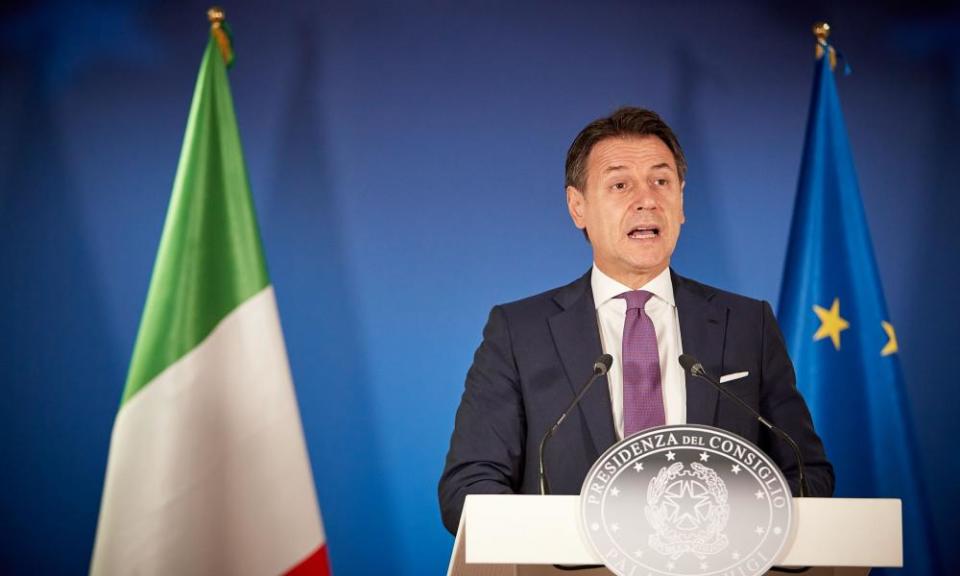Italian PM urges UK to do right thing on Brexit deal

Italy’s prime minister, Giuseppe Conte, has urged the British government to come good on a Brexit deal but admitted it was currently “difficult to feel optimistic” amid legal wrangling over the withdrawal agreement.
“Obviously the legislative move in the UK creates tension,” said Conte, referring to Boris Johnson’s tabling of a bill that violates key elements of the agreement reached with Brussels last year.
“But beyond this step I believe there will be an agreement in the end … and trust that the British government will be willing to reach one that ensures reciprocal advantages,” he said in an interview with the Guardian and five other European newspapers in Rome.
Conte is under pressure from Italian exporters to ensure a favourable Brexit outcome amid fears that Johnson’s move could jeopardise commercial relations with one of Italy’s biggest markets.
A law professor from Puglia, Conte arrived on the political scene in June 2018 after being plucked from obscurity to lead a coalition between the Five Star Movement (M5S) and Matteo Salvini’s far-right League. That alliance collapsed in the summer of 2019 after Salvini’s failed attempt to bring about snap elections.
Related: EU needs clear sign UK will get real in Brexit talks, says Irish minister
Conte had been expected to quietly step aside, but in what was the first indication of his growing confidence, he delivered a blistering attack against Salvini in parliament before carving out a new majority between M5S and the centre-left Democratic party.
From a figure once derided as a “puppet” between warring coalition partners, Conte is now immensely popular in Italy for the way he has so far handled the coronavirus pandemic. Italy, the first hit of the European countries, has the continent’s highest death toll after the UK but has so far avoided the kind of sudden leap in infections since the summer seen elsewhere.
Whether he manages to retain Italians’ trust is very much hinged on his coalition’s ability to transform the country’s post-pandemic economy. Conte was praised, even by detractors, for managing to secure Italy the largest share – €209bn – of the European Recovery Fund after torturous negotiations in July.
“This government has an opportunity that no other government has had before,” Conte said. “But with this great opportunity also comes great responsibility. This is why I said that if we fail [to deliver] it would be shameful, and we must be sent packing.”
Developing infrastructure, including roads, railways, airports and ports, is on the agenda, as is pursuing “ecological change” and investing in education and research. He also envisages a digitalised future for Italy. “Imagine, there are those living in mountain villages who don’t even have a phone connection.”
He said: “Austerity policies and public debt have penalised investment in human capital and made us less competitive. We must revolutionise. So many bright Italian graduates seek their fortune abroad, but we must provide them with a future here.”
Conte won the hearts of many Italians during the early stages of the coronavirus emergency with his calm, assured and empathic messages. As he announced a national lockdown, he said: “Let’s remain distant today so we can hug with more warmth tomorrow.”
The words made an impact. “It was a message to Italian citizens calling them to make great sacrifices, but it was also a message of hope and confidence in the future,” he said in the interview. “Deaths were increasing every day and this was very painful. We had to stay focused and ask for maximum cohesion of all citizens while trying to maintain a relationship of trust – this was fundamental.”
Daily new cases rose to 3,678 on Wednesday, the highest since mid-April, just as the government made it obligatory to wear face masks outside. A state of emergency has been extended until the end of January, meaning Conte will continue to have the power to impose a lockdown and other safety measures without the approval of parliament.
“Behind the reality of the Italian epidemiological data there is no miracle, but the very hard efforts and sacrifices of the entire country, which allowed us to overcome the most acute phase of the pandemic and now allows us to face this new phase with a great sense of responsibility and attention,” Conte said.
Praise for the country has brought no comfort to the families of victims driving an investigation by prosecutors in Bergamo, the northern province worst hit by the virus, into alleged errors by authorities at the beginning of the pandemic. Conte was questioned by prosecutors in June. More than 36,000 Italians have died from the virus.
“Whoever loses a loved one wants answers and judicial truth, and this is perfectly understandable,” Conte said. “The prosecution summoned me as a person informed about the facts and if they do so again I would be willing to provide the facts I know.
“We are living in a situation that was unthinkable for all of us. Some accuse me of having done too much, of being a liberticide, while others accuse me of having done too little. I’m aware that before responding to public opinion or a judicial authority, I should respond to my conscience. And I say this humbly: I think I did everything possible to manage a really difficult situation.”

 Yahoo Finance
Yahoo Finance 